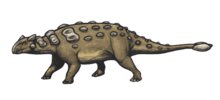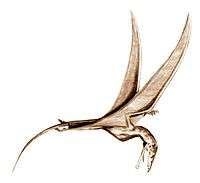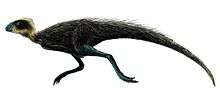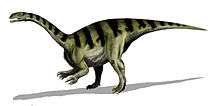Emausaurus
| Emausaurus Temporal range: Early Jurassic, Toarcian | |
|---|---|
| Scientific classification | |
| Kingdom: | Animalia |
| Phylum: | Chordata |
| Class: | Reptilia |
| Clade: | Dinosauria |
| Order: | †Ornithischia |
| Clade: | †Thyreophora |
| Genus: | †Emausaurus Haubold, 1990 |
| Species: | †E. ernsti |
| Binomial name | |
| Emausaurus ernsti Haubold, 1990 | |
Emausaurus is a genus of thyreophoran or armored dinosaur from the Early Jurassic. Its fossils have been found in Germany. It is known from a skull, lower jaws and partial postcranial remains, although only the skull is known well. Armor includes three conical scutes and one tall, spiny element.[1]
The type species, Emausaurus ernsti, was formalized by Harmut Haubold in 1990.[2] The generic name is composed of an acronym of Ernst Moritz Arndt University of Greifswald (Ernst-Moritz-Arndt-Universität or EMAU) and Greek sauros/σαυρος (lizard). The specific name is derived from the name of geologist Werner Ernst, who found the fossil, holotype SGWG 85, in the summer of 1963 at a loampit near Grimmen, in strata dating from the Toarcian.
The body length of the holotype of Emausaurus has been estimated at around two metres. This represented a juvenile individual though; adult length has been estimated at four metres. It was, despite its small size, probably quadrupedal and ate low vegetation.
Cladistic analyses showed that Emausaurus was a basal member of the Thyreophora, more derived than Scutellosaurus, but less than Scelidosaurus.
References
- ↑ Norman, D.B.; Witmer, L.M. & Weishampel, D.B. (2004). "Basal Thyreophora". In Weishampel, D.B.; Dodson, P. & Osmólska, H. The Dinosauria, 2nd Edition. University of Californian Press. pp. 335–342. ISBN 0-520-24209-2.
- ↑ Haubold, H. 1990. Ein neuer Dinosaurier (Ornithischia, Thyreophora) aus dem Unteren Jura des nördlichen Mitteleuropa. Revue de Paleobiologie 9(1):149-177. [In German]





